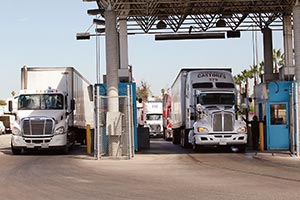Fate of Cross-Border Trucking Still Unclear After Report Calls Mexican Pilot Too Small

This story appears in the Jan. 12 print edition of Transport Topics.
The possibility of more Mexican trucks running in the United States is still up in the air after a recent report by the Department of Transportation’s Inspector General concluded participation in a three-year pilot program was too small to yield sufficient safety data.
The IG said its report, released Dec. 29, does not contain any recommendations for the future because the pilot has ended. The three-year experiment concluded in October.
Congress has been sent the report but in the past has tried to block Mexican carriers from running in the United States beyond designated commercial zones at the border.
Congress has been waiting three years for the results of the “so-called pilot” to test whether or not Mexican carriers pose a safety risk to our roads, said Rep. Peter DeFazio (D-Ore.).
UPDATE: U.S. opens border to Mexican trucks
“As the IG’s latest report shows, we still don’t know the answer,” said DeFazio, ranking member on the House Transportation Committee. “Congress has told DOT to put the brakes on cross-border trucking on multiple occasions and with strong bipartisan votes, and I anticipate this topic will come up again this Congress.”
The IG report said: “Because the pilot program lacked an adequate number of participants, we could not determine with confidence whether the 15 carriers are representative.
“Without being able to determine the representativeness of the 15 carriers, one cannot project the safety performance for the population of Mexico-domiciled carriers that may qualify for long-haul operating authority in the future,” the IG said.
The report concluded that the carriers in the pilot program did operate safely, but the limited participation skewed the results. For example, when the pilot was created, FMCSA estimated it needed 46 participants to reach its goal of doing 4,100 inspections.
However, 90% (25,630 out of 28,225) of the border crossings and 80% (4,473 out of 5,545) of the inspections conducted were attributed to only two carriers, the IG said.
But one thing is known to have resulted from the pilot.
“Based upon successful completion of the program, as well as a review of safety and inspection data collected during the program, the department converted the 13 remaining participants to provisional or standard operating authority, allowing those carriers to continue to operate in the United States after the pilot ended,” Marissa Padilla, FMCSA’s director of communications, told Transport Topics.
American Trucking Associations is monitoring the situation, said Martin Rojas, vice president for security and operations. He added that the federation doesn’t want another trade war because the last one harmed U.S. carriers.
“We want to see this resolved in a manner that satisfies both sides’ concerns and [has] all carriers operating across the border operate with the highest regard for safety, security and comply with the regulatory requirements,” he said.
Like the IG, others are questioning the adequacy of the pilot.
“Part of the criteria for a successful pilot program is having the statistical data that’s necessary, so they fell short on that,” said Fred McLuckie, federal legislative director for the Teamsters union, which has opposed more Mexican longhaul carriers in the United States.
“Does that invalidate the entire pilot program? Technically, it seems that it would,” McLuckie said.
The Mexican truck issue dates to 1994, when the North American Free Trade Agreement took effect. The U.S. was to open its borders to more longhaul Mexican trucks, but that was delayed by questions from the Teamsters and others about safety standards for Mexican trucks.
In 2002, standards were adopted and a demonstration project was scheduled, but Congress blocked the funding, triggering Mexican tariffs on some American products.
The Obama administration negotiated a settlement with Mexico and created the three-year pilot.
Obama and Mexican President Enrique Peña Nieto held trade talks at the White House last week, but they did not say whether they addressed trucking issues.

